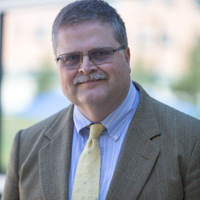‘Look at news that challenges your assumptions’

James Kates is a professor in the Department of Communication. He worked as an editor at metropolitan newspapers for 25 years.
September 26, 2021
Here’s a confession: When I’m looking for a quick read on the news, sometimes I’ll turn to the Drudge Report.
Maybe you’re familiar with the site. It’s a “news aggregator,” meaning it collects stories of wide interest from all over the Web. Matt Drudge, the editor, built a reputation in the 1990s with some salacious original reporting on the Bill Clinton-Monica Lewinsky scandal.
Drudge is something of a shadowy figure. He leans conservative to libertarian in his politics. His hugely popular website carries a tone of impending doom. Its crude design, with banner headlines that practically shout at you, has not changed since Clinton was president.
Yet here’s why I like it: When I click on a story link, I never quite know what I’m going to get.
It might be a piece from the steadfastly liberal Guardian, the English newspaper site that has more readers in the United States than it does in Britain. It might be a more-or-less neutral story from The Associated Press, published on the website of a newspaper or TV station. It might be something with a decidedly conservative take, perhaps from the National Review.
In his quest for the apocalyptic or the merely titillating, Matt Drudge is an equal opportunity aggregator. He often manages to surprise me, and I like that.
Which brings me to a central problem with the news media today: Too many media pander to “confirmation bias,” our tendency to seek out viewpoints that mirror our own.
Confirmation bias is not new, but news reporting that caters to it has proliferated in recent years.
I earned a journalism degree at Michigan State in 1980. June 1 of that year marked the launch of Cable News Network (CNN). The following spring, Walter Cronkite retired from his longtime job as anchor of the “CBS Evening News.”
Those two events signaled the beginning of a journalism revolution, though I didn’t recognize it at the time. Starting with cable channels, and accelerating with the World Wide Web in the 1990s, dozens of news providers rose up and began serving the interests of smaller, more specialized audiences.
Cable channels discovered that it was cheaper to provide analysis and opinion than to do real reporting. Washington is full of professional pundits eager to join cable gabfests. That’s how they get book contracts and speaking engagements.
The Internet not only satisfied its audience’s confirmation biases, but intensified them. On the Web, publishers found that they could earn clicks by giving audiences reliably conservative or liberal points of view.
For better or worse, it didn’t used to be like this. When the United States had three major television networks and a handful of big newspapers, most media were mass media. News was delivered in scheduled offerings, not 24 hours a day.
When the evening news ran just 30 minutes, there wasn’t much room for divergence of opinion. I often tell my classes that people who supported the Vietnam War and those who opposed it all watched Cronkite.
Even newspapers, with far greater breadth than TV, were all-in-one packages that served everyone with everything: news, sports, business, movie listings, crossword puzzles and comic strips. Some people didn’t read the news at all. They bought the newspaper for the baseball scores and the grocery ads.
The downside to those “good old days” was that differing views were not always available. If you wanted something with a hard edge to it, you had to go to a journal of opinion – maybe The New Republic – or the editorial page of The Wall Street Journal. Most people didn’t bother.
Today there is a glut of information, and people assemble their own world view based on information of their choice. I don’t whine about the passing of the old days, because there’s a lot to like about digital journalism. Even if we wanted to go back, we couldn’t.
But consumers of news now owe it to themselves – and to our democracy – to broaden their news consumption to include things that make them uncomfortable.
Don’t give in to confirmation bias. Look at news that challenges your assumptions. And remember that opinion does not always equate with knowledge, much less wisdom.













